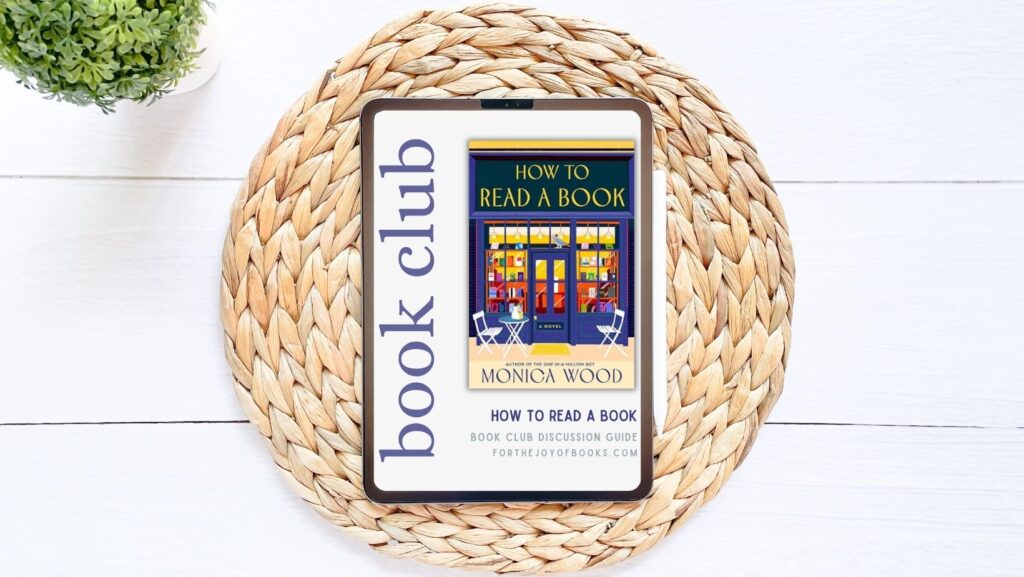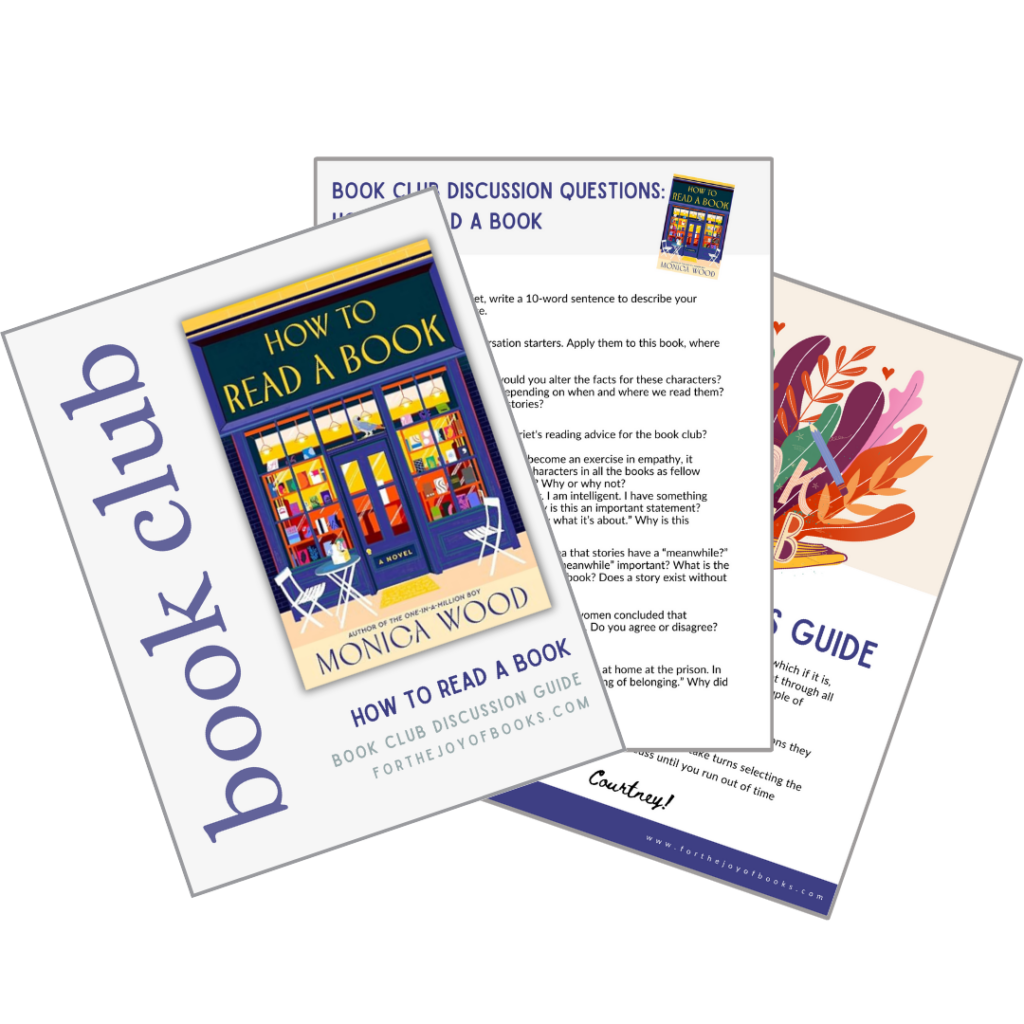This post may contain affiliate links, which means I’ll receive a commission if you purchase through my link, at no extra cost to you. Please read full disclosure here.
Your book club needs to read this book. Here’s why: In How to Read a Book by Monica Wood, you not only get a great story, but there are also so many insights into how to talk about books.

Why Choose How to Read a Book for Your Next Book Club Read?
How to Read a Book is about a retired school teacher who runs a book club at a local women’s prison outside of Portland, Maine. To say this group of women is a tough crowd is an understatement.
In fact, one of the things you learn from the first chapter is that these women love to complain about the books and the characters in the books. (Now, that doesn’t mean they don’t like book club. Complaining about the books is part of the fun 😉.)
But Harriet, or “The Book Club Lady” or “Bookie,” as they like to call her, has her work cut out for her. Part of her challenge is teaching the women how to empathize with characters who may have very different lives than they do. In the process, she teaches them how to talk about the books and discuss the books they are reading.
(It is so much fun to see what types of books finally resonate. )
If you are looking for a great read for your book club, I can confidently recommend How to Read a Book by Monica Wood.
Read my full review of How to Read a Book here.

Free PDF Download
Download the Book Club Discussion Guide!
Find the discussion guide in the free resource library!
40+ How to Read a Book Book Club Discussion Questions
IMPORTANT NOTE: These book club discussion questions assume you have read the book, and therefore, they DO INCLUDE SPOILERS. Proceed with caution.
- In honor of Harriet, write a 10-word sentence to describe your reading experience.
- Use Harriet’s conversation starters. Apply them to this book, where applicable:
- If you were God, would you alter the facts for these characters?
- Do books change depending on when and where we read them?
- Why do people tell stories?
- What do you think of Harriet’s reading advice for the book club?
- “In order for reading to become an exercise in empathy, it helps to think of all the characters in all the books as fellow creatures.” Do you agree? Why or why not?
- The mantra: “I am a reader. I am intelligent. I have something worthy to contribute.” Why is this an important statement?
- “Let it settle before deciding what it’s about.” Why is this important?
- What do you think of Harriet’s idea that stories have a “meanwhile?” (See page 62/Ch.9)? Why is this “meanwhile” important? What is the “story” and the “meanwhile” in this book? Does a story exist without its “meanwhile?”
- After reading Franny and Zooey, the women concluded that having an existential crisis was a luxury. Do you agree or disagree? Why or why not?
- In Chapter 3, the narrator says Harriet felt at home at the prison. In Chapter 13, it says that Harriet “felt a stirring of belonging.” Why did she feel so at home there?
- Do you think Harriet made a mistake by telling the inmates too much about her personal life? Why or why not?
- Why do you think Harriet not only started doing the book club, and why does she keep on doing it?
- Why do the inmates like “Bookie?” Why do you think they are so comfortable with her?
- At the beginning of Chapter 3, Harriet compares reading to gardening. In what way is reading like gardening?
- What was it about Spoon River Anthology that resonated with the book club?
- Why did poetry work so well with the book club?
- Why does Violet feel less safe outside of prison than inside? (See page 41.)
- What do you think about the following characters in the book:
- Sophie. Why was Sophie such a jerk to Violet?
- Kristy. Do you think she was right to push for Violet’s trial? Compare and contrast her relationship with her mom and her dad.
- Dr. Petrov. What drives Violet’s relationship with him? Why was this relationship doomed from the beginning?
- Why do Sophie and Violet see Harriet so differently? (See the beginning of Chapter 12)
- Why did the women like stories about Lou?
- On page 100 (Chapter 13), Harriet says that book club “always felt like a cocoon,” but in that same paragraph, she realizes that this idea is flawed. What causes her to change her mind?
- How does leading the book club change Harriet?
- Why was the job at the research lab a good fit for Violet?
- On p.47, after recounting her relationship with Troy, Violet says that she “would know a red flag in a hot minute.” Why does she fail to see the red flags with Dr. Petrov? Why does she fall for him?
- Why was Frank’s apology gift important for his relationship with both Harriet and Violet?
- Dr. Petrov teaches Violet to “observe and then conclude” when it comes to working in the lab (Chapter 16). How does this theme relate to the rest of the story?
- Did Frank make the right decision not to tell Kristy that Lorraine was having an affair and was planning to end their marriage? Why or why not?
- In Chapter 18, Harriet asks Violet if someone else besides her was driving the car that hit Lorraine. How was Troy also to blame for the accident?
- What makes the gifts that Violet receives so special, such as the afghan blanket that Mrs. Rocha gives her and the bookends that Frank makes and gives? Why does she cherish them so much?
- Harriet says that every group eventually develops a personality, and she describes the book club’s personality like this: “Book Club had decided they were misunderstood souls born to the wrong era, and William Butler Yeats was their proof.” Why did Yeats have this impact on them? (For reference, here’s one of the poems they read by him: A Prayer for my Daughter.)
- Both Harriet and Frank reveal mistakes they made. What do you make of Harriet’s revelation about her father in Chapter 19 (p. 170)?
- In what way are the bookshop workers almost like a Greek Chorus? Read the section in Chapter 19, starting on p. 171, which starts with “All at once. . . .” for reference.
- Discuss the impact that Pastor Rick had on Violet and her family. Why does legalism always backfire?
- In Chapter 20 (p. 177), Violet says that when Frank shows her mercy, she feels like she’s meeting her father. What leads her to this conclusion?
- I think this book falls under the “found-family” trope. Do you agree or disagree? Why or why not?
- How do you see both Frank and Harriet start to become parental figures for Violet? Why are these relationships a key to her succeeding outside of prison?
- Compare and contrast Lorraine and Harriet, and Frank’s relationship with each person.
- Compare and contrast Lou and Frank, and Harriet’s relationship with each person.
- If you’re a Christian, what do Violet’s self-righteous Christian family members get wrong? Or are they justified in being so mad at Violet?
- What did you think about Violet’s meeting with Troy in Chapter 22?
- How did the book club transform into a writing club?
- Why does Harriet end up getting fired? Do you think she should have done anything differently?
- Two of the main characters in this book are retired. How does the book show the challenges that individuals face during this time of their lives?
- In Chapter 26, p. 233, Violet says the following: “Reading one book makes it part of all the books you’ve ever read, Harriet said, so she was forever dragging other books into our discussion.” She then gives a couple of examples. What books would you drag into this book?
- What’s the “story” and the “meanwhile” in Dr. Petrov and Violet’s relationship?
- Even though Violet is rejected by her self-righteous family members, she comforts herself by singing old hymns while she works. Why do you think she found comfort in these hymns?
- Was it inevitable that one of the inmates would show up at Harriet’s house?
- What do you think of Violet’s Spoon River-inspired epithet that she writes for herself at the end of the book?
- The book has three main characters, and the story is told from alternate points of view, but only Violet’s character is told in first person. Why do you think this is? What impact does this have on the story?
